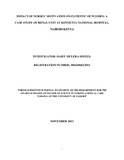| dc.description.abstract | Introduction: In the health care systems, motivation plays an important role in retaining health
care personnel. This in turn increases productivity of the health care systems which is manifested
in patients’ outcomes. There are several motivational patterns in the nursing profession such
rewards, relationship, challenge, control and drive. Patient satisfaction, quality of life, symptoms,
morbidity and mortality are some of the patient outcomes in the health care service.
Objective: The study sought to explore the impact of nurses’ motivation on the patients’
outcome in Renal Unit at Kenyatta National Hospital.
Methods: This was a cross sectional descriptive quantitative study whereby semi-structured
questionnaires and checklists were used to collect data from 45 nurses and 150 patients from the
renal unit at Kenyatta National Hospital (KNH) after the approval from KNH/UON institutional
review board. The study period was from January 2013 to June 2013. The purposive sampling
was used to get the participants and the site of the study. The data was analyzed using Statistical
Packages for Social Sciences (SPSS) version 17. Participation in the study was voluntary and
based on respondents’ ability to give informed consent.
Results: A total of 45 nurses and 150 patients from renal unit participated in the study. From the
study findings, it was revealed that male nurses were more motivated with recognition than
females nurses at p=0.046. It was further noted that married nurses were more motivated with
achievement at p=0.044 and autonomy at p=0.026. The single nurses were less motivated with
renumeration than the married and divorced and the relationship was statistically significant. It
was noted that nurses who had worked more than seven years were more motivated with
achievement at p=0.044 and autonomy at p= 0.026 than their counterpart. Nurses who had
xiv
worked for less than seven years were less motivated with renumeration. This relationship was
statistically significant P=0.005
The patients’ outcomes were also explored in terms of patient satisfaction and other patients’
outcomes. It was established that patients were more satisfied with nurses good listening skills,
being treated as individuals, nurses positive attitude, nurses responsiveness, and information
provision. Their relationships were statistically significant p<0.05 with age and marital status. It
was also noted that patients who were less than 20 years old were more stressed post dialysis
than the other age groups at p=0.013. It was further noted that there was a relationship between
the nurses’ motivation level and the patients’ outcomes at renal unit of KNH.
Conclusion: The study revealed that nurses in renal unit of KNH are motivated with
achievement, recognition, autonomy and renumeration. The patients were satisfied with nurses’
good listening skills, being treated as individuals, nurses’ responsiveness, and provision of
information. | en |
| dc.description.department | a
Department of Psychiatry, University of Nairobi, ; bDepartment of Mental Health, School of Medicine,
Moi University, Eldoret, Kenya | |

